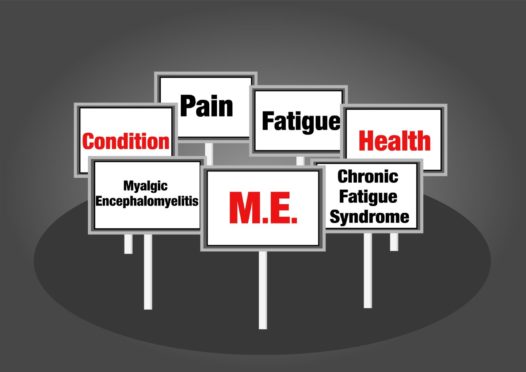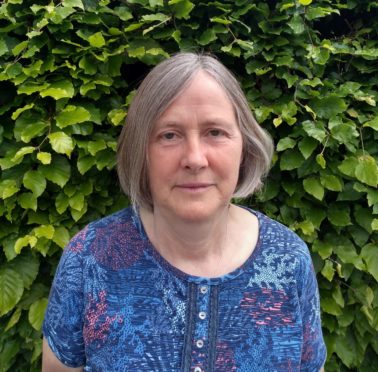Campaigners have voiced their fury over a watchdog’s decision to delay updating guidance for doctors treating patients with ME.
The new guidelines were expected to recommend that patients in England and Wales are referred by their GPs to specialist clinics with teams experienced in treating the condition.
It was hoped the Scottish Government would also take on board the new recommendations.
Draft guidelines drawn up by the National Institute for Health and Care Excellence (NICE) body in November stated doctors should also stop recommending ‘graded exercise’ as a treatment.
Campaigners say these programmes, which increase the level of exercise for patients in increments, are doing many patients more harm than good.
‘It was close to the wire then they pulled out’
Amanda Stephen, 45, of Aberdeen, has been living with ME for most of her life after being diagnosed with the condition when she was 19.
The charity worker said patients were frustrated after a long battle with the medical professions to get the guidelines changed.
“It seems to be that NICE has withdrawn them because the medical profession don’t agree with the guidelines. They’ve had all this time and they’ve waited until the last minute to say this,” she said.
“We’re all disappointed, it has taken them so long and it was close to the wire then they pulled out.
“If you go to your GP and you’re newly diagnosed there’s no specialist clinic up here so if the NICE guidelines recommend graded exercise then that’s what they will do, they will then refer you to occupational or physical therapy.
“If you’re newly diagnosed and don’t know about all the controversy and think this will make you feel better then you will do it.
“We’ve fought so hard to get rid of this recommendation so it is so frustrating.”
‘Exercise can make symptoms worse’
In the draft guidelines, NICE recommended that patients should be told about the ‘risks and benefits’ of exercise programmes.
And it was highlighted that some people with ME have found that graded exercise made their symptoms worse.
The therapy has been recommended to patients for the past 13 years, but the draft recommendations said people should remain in their “energy envelope” while carrying out physical activities.
The final guidance was due to be published this week following a consultation on the draft guidelines.
But there has now been a delay due to “strong” opposing views on how to treat the debilitating condition.
It’s understood that four members of the NICE committee have resigned in recent weeks.
‘A lot of people will be mentally affected by this’
Campaign group #MEAction Scotland has now written to NICE asking the watchdog to explain their reasons for the delay.
Volunteer Helen McDade said: “We’re furious. We’re very concerned for the physical and mental health in people with ME, it is a setback.”
Helen highlighted that GPs were currently restricted to following the current recommendations while treating patients because there are no specialist clinics in Scotland.
She said graded exercise was also harming a “considerable” number of patients whose bodies are unable to tolerate too much exertion.
“It’s a very bleak day for people with ME. A lot of people will be mentally affected by this,” stated Helen.
“We’ve had lots of messages from people who are distraught who’ve waited for years for this to be turned around.
“We are still pushing forward and hoping the Scottish Government will do the right thing and set up specialist teams to see people with ME.”
Why has NICE delayed the guidance?
The health watchdog says the guideline recognises that ME/CFS is a “complex, multi-system, chronic” medical condition and advised there is no “one size fits all” approach.
In a statement the body said: “The causes of ME/CFS are still poorly understood and because of this there are strong views around the management of this debilitating condition.
“Because of issues raised during the pre-publication period with the final guideline, we need to take time to consider next steps. We need to do this so that the guideline is supported.
“We want to thank everyone who has contributed to this guideline and particularly the committee and the patient groups who have worked so diligently.
“However, unless the recommendations in the guideline are supported and implemented by professionals and the NHS, people with ME/CFS may not get the care and help they need.”
NICE said it recognised the importance of the guidelines and has now announced it will hold a meeting with patient organisations and NHS England to discuss the issues.
Paul Chrisp, director for the Centre for Guidelines at NICE, said: “ We remain optimistic that we can reach a way forward to publish a guideline that will have the support of people living with ME/CFS, the people who care for them and the professionals who treat them.”
The Scottish Government said they understood how “distressing and debilitating” ME/CFS can be.
A spokeswoman said: “We are disappointed to learn that the guidelines scheduled to be published by the National Institute for Health and Care Excellence (NICE) have been paused.
“We will continue to work with both NICE and stakeholders in Scotland in ensuring that everyone living with ME/CFS is able to access the best possible care and support, with healthcare services that are safe, effective and people-focused.
“We are engaging with people living with ME/CFS, the clinical community, and third sector organisations to fund research, gain greater understanding of what good care looks like and raise awareness with the development of training materials for healthcare professionals, taking into account this final guideline when it is published.”
More health articles….
Patients will need to wait longer for operations because of Covid
Friends battling health conditions thank children for their kindness
Hepatitis – the symptoms that can go undetected
Do you know how many calories are in your favourite tipple?


